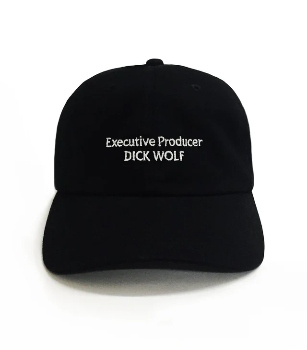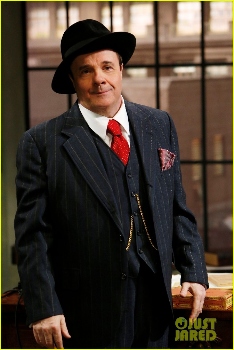
This week on the podcast I had the pleasure of sitting down with commercial producer Eric Cornell (Co-Producer: Oklahoma!, To Kill a Mockingbird, What the Constitution Means to Me, Head Over Heels, Hello Dolly! First National Tour; Executive Producer: Anastasia, Rocky; Upcoming: Anne of Green Gables) for a conversation about producing, company management, international theatre, the Broadway market, and everything in between. For those of you who have ever looked for a crash course in how commercial Broadway producing works (What is a co-producer vs. a lead producer vs. an executive producer? Who gets to be above the title in the playbill?), look no further than this episode, where Eric helpfully breaks down all the different levels to Broadway producing and the ways it might differ from, say, film and TV producing, with which many of us are quite familiar by osmosis (if the sales of this hat is any indication, the average person has at least a passing understanding of TV producers and who they are).

And indeed: that brings me to a theme of the episode, and something about which I’ve been thinking for quite some time. I’ve been seeing Broadway shows for over twenty years, and the (often large) group of people, and organizations, responsible for the financial backing and leadership of the shows was never something I heard much about, or about which I could glean. I’ve worked professionally in theatre for eight years, and the same is true: I often had no idea who the people were who got up onstage at the Tonys to accept the Best Musical award, nor did I really understand the difference, frankly, between those people and the Shuberts or the Nederlanders. In fact, I was so clueless that the word Shubert indicated nothing more to me than one of the Broadway theaters that would have Dots candy available for purchase (my family and I used to divide Broadway theaters into Dots or non-Dots theaters, and early on we noticed that the Shuberts seemed the most pro-Dots. Clearly an extremely important scientific analysis). Eventually, as I’ve written about before, I went to graduate school for performing arts administration, but even there, the focus was mostly on the nonprofit world, where there are clear hierarchies, org charts, and chains of command to follow. There were a few specialized courses, and, of course, we could ask questions, but most of the time we were told that commercial producing was a lot like start-up culture: super flat hierarchies making extremely high-risk investments (mostly doomed to fail).
Of course, there are programs like the Columbia MFA in producing that focus specifically on commercial producing (and I’m sure it takes a student through all of the ins and outs very effectively). Nevertheless, it’s become clear to me that not only to the average layperson or Broadway fan, but also even to the standard professional theatre worker, the world of commercial theatrical producing is rather opaque.
As Eric and I discuss on the podcast, I think that’s to some extent by design — do people really want to see how the sausage gets made? I also think part of this lack of transparency is about people’s tendency, especially today, to see everything in a binary, and hold an “us vs. them” mentality. As Eric notes on the podcast several times, “managers are people too…[W]e are part of the experience in the same way you are. It was our dream to work in theater,” he continues. “It wasn’t our dream to count dollars. So we’re theater people too. And just like there’s actors and crew members and musicians and designers and directors that you can be like, ‘that person annoys me, that person’s a bad actor, that person’s a difficult person,’ there can be producers like that. But for the most part, I think people need to remember we’re part of this with you.”
Indeed, I’d argue part of this binary, or this us vs. them attitude, can be traced back to the way that producers, especially theatre producers, have been portrayed culturally — even in theatre itself. You think about a musical like The Producers — on which Eric worked at the beginning of his career. The entire premise of the musical is about how Broadway producers are sheisters…just looking for the next way to make a buck, illegally or otherwise. No real sense of the art, and no real love for it either — just taking advantage of little old ladies for their wealth, and maybe sleeping with a beautiful secretary or two. While The Producers is obviously a comedy, and a show that can make me laugh like nothing else, I believe that stereotype, of the big, top-hat wearing, cigar-smoking (white, male) producer still holds water today. And while I enjoy a Sardi’s martini as much as the next gal, I believe contemporary commercial producing is, and can be, a lot more than that.

In fact, I think it’s to the theatre industry’s detriment that this stereotype, or binary, still exists. If the world of commercial producing is so shadowy and opaque, it creates the culture of gatekeeping which theatre people are constantly decrying. If young, bright-eyed theatre people — from all different backgrounds — don’t understand what it is that a producer does, or has a misconception about it, or sees producers as enemies to the artists themselves, it’s more than likely that he or she won’t give it a shot, even if they’re interested in “the business side of things.” They’ll throw up their hands and say, “Well, I’m not uber-wealthy, so how could I ever be a producer?” or “I’m not white or not male so how could I ever produce a show on Broadway?” Or they even might say, “I have no clue how any of this stuff works and I thought only, like, five people do it, so how could I possibly hope to be one of those five?” Ironically, that kind of thinking perpetuates the Broadway producer myth — as no new types of producers, coming from different backgrounds or with different connections to different communities, are encouraged to roll the dice and give it a shot.
And that, to me, is one of the biggest flaws in the system right now. As I say on the podcast, we can “diversify” our casts, companies, creative teams, bands, orchestras, all we want, but a crucial part of the mix will always be the money — and who secures it. If we do not work to get producers from all different backgrounds — especially, in my opinion, young producers — into the fold, any conversation about equity, or even the future of theatre, is incomplete.
And as Eric says on the podcast — this should be the most exciting time, potentially in theatre history, for young, ambitious producers or theatre artists of all kinds. “This pandemic has changed everything,” Eric says on the podcast. “If I were a young person right now, if I was any person right now, I think now is the most exciting time to be in the arts in the last 50 years. No one knows what they’re doing. It has leveled the playing field.”
Eric described this phenomenon when I asked him what he was hopeful about when it came to theatre today. I feel like most arts columnists — myself included — spend a great deal of time these days writing about problems and challenges, with a mostly dire outlook. And, not to say that things aren’t dire, but, partially because of how challenging the moment is, and the fact that, as Eric says on the podcast, “no one knows what they’re doing [anymore]” — so-called theatrical “rules” are being broken left and right, and a great deal of protocol or industry understandings have gone out the window — it’s an exciting moment for change, especially coming from young people. As I wrote about two weeks ago, I think we’re seeing a moment where young, ambitious artists are taking the temperature of the room, seeing which way the wind blows, throwing up their hands, and saying — I’m going to do what I’ve always wanted to do, regardless of industry protocol or what people say. Whether that’s putting on a clown show, a rough and ready showcase code version of your friend’s play, or that version of Paradise Lost you’ve been thinking about since college (all things friends of mine are actively doing by the way), we’re in a moment where kind of anything goes, and if it’s good, and if there’s an audience, you will be successful, no matter who you are.
And that’s why I, and Eric, feel so passionately about making the world of producing so much more transparent to young artists and theatrically-minded people. It’s why Eric teaches a course he designed himself at Boston Conservatory on the Business of Theatre. It’s not even specifically about producing — although there’s an element of that, but it’s more like an overview of everything you need to know to work in theatre today, and especially if you want to have more agency over your career, or become any kind of “multi-hyphenate.” “We go through: How do the markets work? What is Broadway? What’s not?” Eric explains on the podcast. “We read contracts together…we go into depth about the unions, and it’s really rewarding because a lot of these students don’t come from entertainment families, they don’t come from backgrounds like that, and they get to hopefully feel safe in an environment of, ‘Oh, I always knew that I had to be a member of equity to be successful, but I didn’t know what it was. Oh, now I know what it is. And is that even part of the definition of success?’ Maybe it isn’t. So being able to lead them…towards building a foundation that lets them create a definition of success by understanding how the business works. And that, I think, sets you up for more longevity as an artist.”
I’d argue an understanding of all of these factors absolutely sets you up for more longevity in your career. And indeed, it points to the fact that, especially in today’s challenging but exciting theatrical economic landscape, more and more people need to be multi-hyphenates. As Eric and I discuss on the podcast, that concept used to be quite taboo in the theatre industry. In some corners it still is! But within this current moment of possibility, which, as discussed above, is absolutely necessary to the progress of the Broadway market, artists of all kinds to some extent need an understanding of, and a mastery of, multiple skills and areas. As discussed in my last article, part of the reason a younger, hipper, more lucrative commercial, Off-Broadway scene is booming is because more young directors, playwrights, and even designers are taking their careers into their own hands and producing themselves. I used to never meet young producers and in the last two years (roughly since the “reopening” post-pandemic) I meet one at least once a month. About half of these producers “wear other hats,” or do multiple things within the theatre industry. And while this information is of course anecdotal, I believe it, as well as Eric’s conversation, speaks to the general direction in which the industry is moving. And, to me — this is good news.

We need to embrace these exciting changes if we, as an industry, want to survive. If the last four years have taught us anything, we cannot rely on the same five people, the same three organizations, or the same model of the cigar-smoking, martini-guzzling producer to not only get us through but to also push the genre forward. As I’ve written before: the nonprofits (unless they own a Broadway house) are failing. The regional theaters are worse. And on Broadway, if you’re not a stunt cast or well-known IP, you’re not faring much better. Based on my conversation with Eric, largely available industry data, and my own observations and writing, I believe that only more transparency about producing and the business of theatre in general, as well as a group of strong, iconoclastic, young, multi-hyphenate artists will help us survive. Take the lifeboat!


Leave a Reply